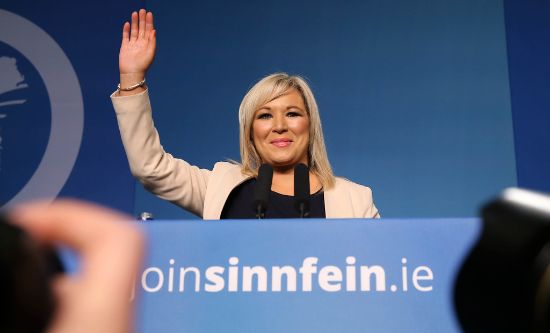
The local elections on 18 May in the Six Counties in the north of Ireland returned Sinn Fein as the biggest party in local government for the first time. This follows Sinn Fein’s electoral success last year when it became the first nationalist party in the history of the Northern Ireland statelet to win the Stormont elections. Sinn Fein has yet to be able to enter government, however, as the devolved government has been defunct since February 2022 when the Democratic Unionist Party (DUP) walked out of Stormont, boycotting it in opposition to post-Brexit trading arrangements. Meanwhile, at a time when 22% of people are food insecure, food grants for the poorest families are being taken away and the NHS is on the brink of collapse.
Pressured by its electoral base in the Loyalist working class, the DUP started its boycott in protest against the Northern Ireland Protocol agreed by Britain and the EU as part of the Brexit deal. Loyalists remain ideologically committed to their union with Britain and are directing frustration at the loss of historic material privileges, at Brexit legislation. When Britain left the EU, it left the customs union and single market, while the north of Ireland has remained in both.
After years of tensions between Britain and the EU on this question, stoked by former Prime Minister Boris Johnson and the careerists in the Tory Party’s European Research Group, Rishi Sunak finally agreed a the ‘Windsor Deal’ with Brussels which greatly reduced checks on goods travelling between Britain and the Six Counties. This deal did not satisfy the Loyalists, however, because it leaves some EU trade rules in place in the north of Ireland.
In the local election Sinn Fein and the ‘non-aligned’ Alliance ran campaigns on the cost of living crisis and getting Stormont back up and running, but for the DUP it was a proxy vote on the Brexit stalemate. The DUP managed to retain 122 councillors, and although Sinn Fein gained 39 councillors compared to the 2019 local election – giving it 144 seats – Unionist parties still collectively hold 185 council seats, against nationalists’ 183.
Sinn Fein now controls six of 11 councils. Michelle O’Neil, Sinn Fein Vice President and First-Minister in waiting, said: ‘My eyes are focused on the future and where we’re headed and I think where we’re headed is into prosperity, into opportunity.’ Even she is unsure what prosperity and opportunity she is talking about, but it certainly is not prosperity and opportunity for poor and working class people in the Six Counties.
Deeper into crisis
On 27 April the Tory Secretary of State for Northern Ireland published the 2023/24 budget for the Six Counties. It announced real term budget cuts for almost every public sector service, including a 2.5% cut for education. Without Stormont, it is up to civil servants to decide where the cuts will come from. Low-income families eligible for free school meals who received support to feed their children during the holidays will have their payments stopped. That is food being taken away from 96,300 children. The mental health and counselling programme – Happy Healthy Minds – for children in primary school will be cut.
The pathetic 0.5% rise on last year for the health budget does not even begin to address the needs of a crippled NHS with the longest waiting lists in the United Kingdom. An Audit Office report found mental health problems in the Six Counties to be around 25% higher than in England, but the funding for mental health is the lowest in the Union. The report found that to bring ‘funding levels in Northern Ireland closer to that elsewhere in the United Kingdom would require substantial additional investment of £80m to £190m per annum.’ That is what is required for mental health services alone, but the Six Counties’ entire health and social care budget has been allocated only about £200m more than it got last year. This is £470m short of funding requirements.
Initiatives to tackle waiting lists are expected to be cut by over £34m while health trusts, already on their knees, are being told to make £55m in savings. Suggestions to cut NHS dental services by £250m have been rejected by British Dental Association Northern Ireland as being the equivalent of ‘taking a wrecking ball to services [that] patients across Northern Ireland depend on.’ In the face of a severe shortfall of nursing staff in the Six Counties, falling wages and increasing poverty, health workers in the north of Ireland have been told they will not get a pay rise.
London and Dublin, as guarantors of the Good Friday Agreement, meet in late May to discuss the political stalemate in the Six Counties. Financial incentives are expected as part of any deal to restore Stormont. These will not be enough to address the long-term acute shortages. It is clear that British imperialism sees no reason to ensure adequate standards of living in Ireland, which raises the question for middle-class nationalists and unionists: might they be better off as part of a united Ireland in the EU imperialist bloc instead?
In the meantime, Sinn Fein will continue to signal to the British ruling class that it can be trusted in power. O’Neill, in complete betrayal of Republican values and the principle of the right to self-determination, legitimised the occupation by attending the coronation of King Charles. Sinn Fein has controlled councils across the Six Counties for decades and shown itself time and time again to be a party of business. It has mounted no campaign to ensure grants continue for the tens of thousands of children now facing hunger during the school holidays. For poor and working class people in the Six Counties, the solution was presented by James Connolly in 1910: ‘the day has passed for patching up the capitalist system; it must go.’
Ria Aibhilin




